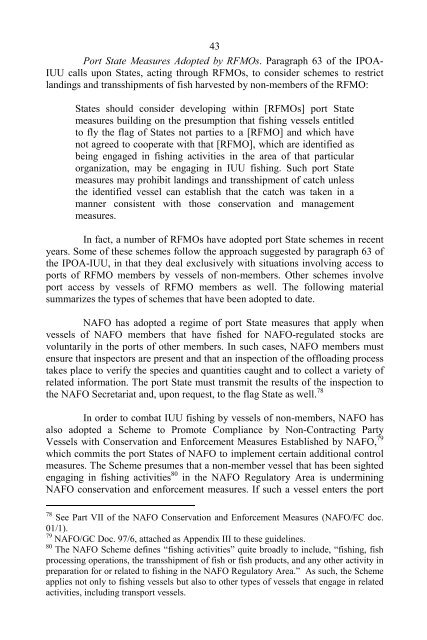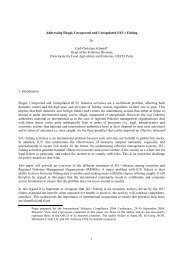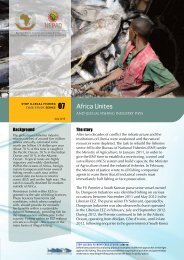Implementation of IPOA/IUU - International MCS Network
Implementation of IPOA/IUU - International MCS Network
Implementation of IPOA/IUU - International MCS Network
You also want an ePaper? Increase the reach of your titles
YUMPU automatically turns print PDFs into web optimized ePapers that Google loves.
43Port State Measures Adopted by RFMOs. Paragraph 63 <strong>of</strong> the <strong>IPOA</strong>-<strong>IUU</strong> calls upon States, acting through RFMOs, to consider schemes to restrictlandings and transshipments <strong>of</strong> fish harvested by non-members <strong>of</strong> the RFMO:States should consider developing within [RFMOs] port Statemeasures building on the presumption that fishing vessels entitledto fly the flag <strong>of</strong> States not parties to a [RFMO] and which havenot agreed to cooperate with that [RFMO], which are identified asbeing engaged in fishing activities in the area <strong>of</strong> that particularorganization, may be engaging in <strong>IUU</strong> fishing. Such port Statemeasures may prohibit landings and transshipment <strong>of</strong> catch unlessthe identified vessel can establish that the catch was taken in amanner consistent with those conservation and managementmeasures.In fact, a number <strong>of</strong> RFMOs have adopted port State schemes in recentyears. Some <strong>of</strong> these schemes follow the approach suggested by paragraph 63 <strong>of</strong>the <strong>IPOA</strong>-<strong>IUU</strong>, in that they deal exclusively with situations involving access toports <strong>of</strong> RFMO members by vessels <strong>of</strong> non-members. Other schemes involveport access by vessels <strong>of</strong> RFMO members as well. The following materialsummarizes the types <strong>of</strong> schemes that have been adopted to date.NAFO has adopted a regime <strong>of</strong> port State measures that apply whenvessels <strong>of</strong> NAFO members that have fished for NAFO-regulated stocks arevoluntarily in the ports <strong>of</strong> other members. In such cases, NAFO members mustensure that inspectors are present and that an inspection <strong>of</strong> the <strong>of</strong>floading processtakes place to verify the species and quantities caught and to collect a variety <strong>of</strong>related information. The port State must transmit the results <strong>of</strong> the inspection tothe NAFO Secretariat and, upon request, to the flag State as well. 78In order to combat <strong>IUU</strong> fishing by vessels <strong>of</strong> non-members, NAFO hasalso adopted a Scheme to Promote Compliance by Non-Contracting PartyVessels with Conservation and Enforcement Measures Established by NAFO, 79which commits the port States <strong>of</strong> NAFO to implement certain additional controlmeasures. The Scheme presumes that a non-member vessel that has been sightedengaging in fishing activities 80 in the NAFO Regulatory Area is underminingNAFO conservation and enforcement measures. If such a vessel enters the port78 See Part VII <strong>of</strong> the NAFO Conservation and Enforcement Measures (NAFO/FC doc.01/1).79 NAFO/GC Doc. 97/6, attached as Appendix III to these guidelines.80 The NAFO Scheme defines “fishing activities” quite broadly to include, “fishing, fishprocessing operations, the transshipment <strong>of</strong> fish or fish products, and any other activity inpreparation for or related to fishing in the NAFO Regulatory Area.” As such, the Schemeapplies not only to fishing vessels but also to other types <strong>of</strong> vessels that engage in relatedactivities, including transport vessels.
















